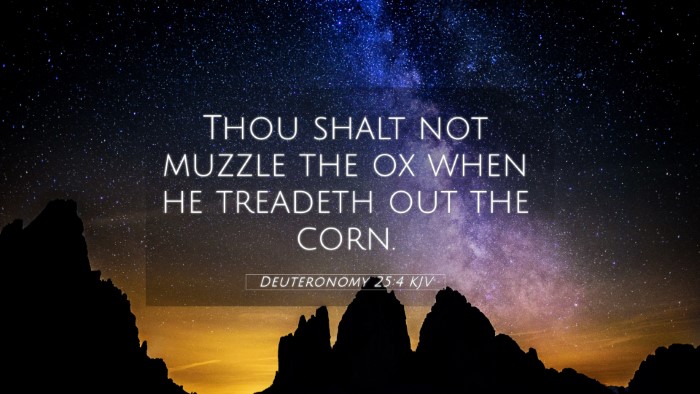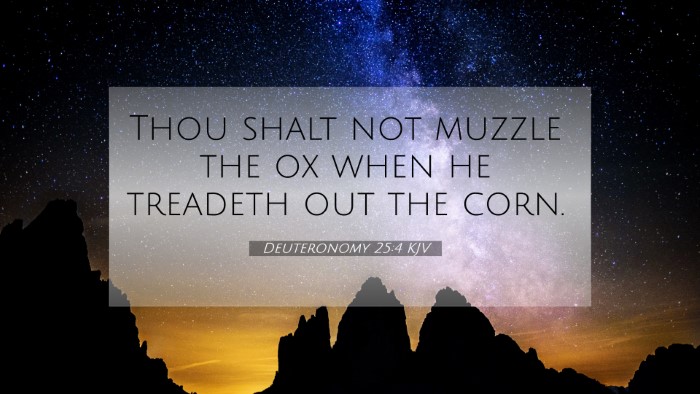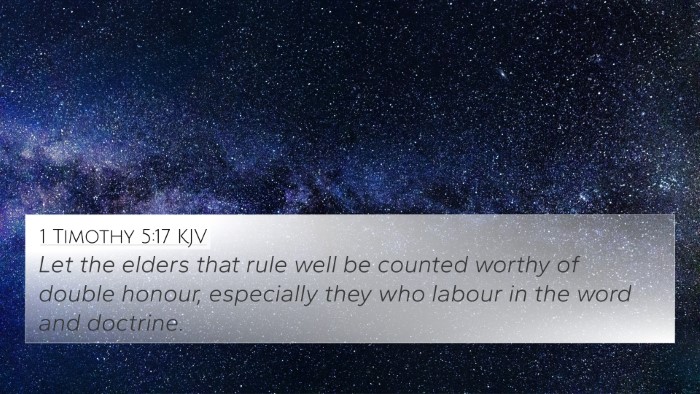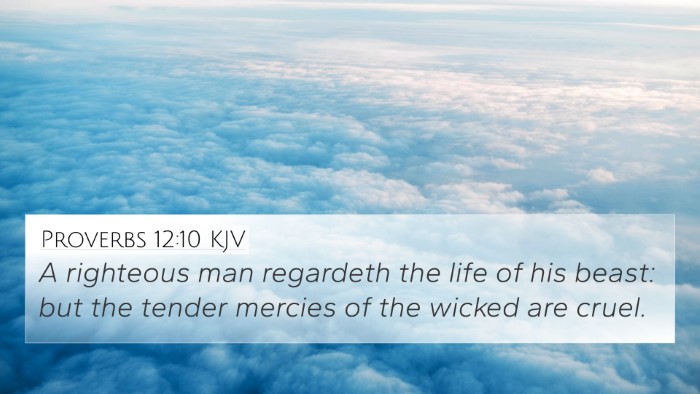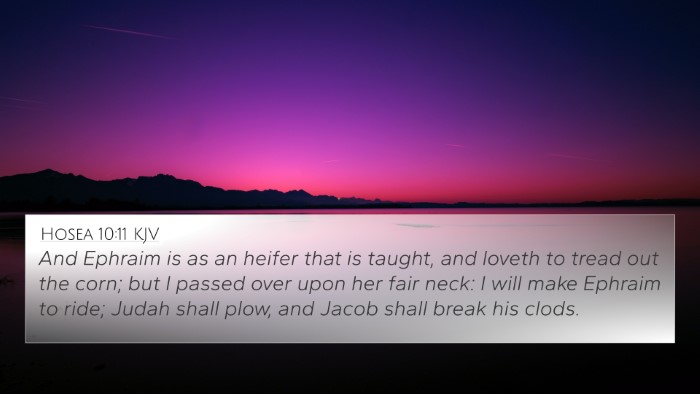Understanding Deuteronomy 25:4
Verse Reference: Deuteronomy 25:4 - "You shall not muzzle an ox when it is treading out the grain."
Meaning and Interpretation
This verse highlights a principle of fairness and consideration towards laborers, using the example of an ox. While the specific command pertains to livestock, its broader ethical implications extend to the treatment of workers and the value of their labor.
Primary Themes
- Labor Rights: The verse emphasizes that animals, particularly oxen employed in agricultural activities, deserve to be treated kindly and fairly, reflecting a broader concern for the rights of all laborers.
- Divine Justice: Implicit in this command is God’s inviolable justice; the treatment of any working being is deemed important, underlining the notion of justice under God’s law.
Insights from Commentators
Insights from various public domain commentaries provide depth to the understanding of this verse:
- Matthew Henry: He emphasizes the ethical dimensions behind this command, suggesting that it illustrates God's care for all creatures and extends to include all forms of labor. The principle that workers should benefit from their labor is universally applicable.
- Albert Barnes: Barnes notes that this statute was intended as a safeguard against inhumane treatment. He draws parallels to the treatment of human laborers as well, asserting that fairness and provision for those who work are central tenets of justice.
- Adam Clarke: Clarke points out the agricultural context of the verse and suggests that the observance of this command would lead to a more humane society. He correlates the treatment of animals with the treatment of people, advocating for a compassionate society that respects labor.
Cross-References to Deuteronomy 25:4
Understanding Deuteronomy 25:4 can be enriched by exploring cross-references that provide thematic and contextual connections:
- 1 Corinthians 9:9 - "For it is written in the Law of Moses, 'You shall not muzzle an ox when it is treading out the grain.' Is it for oxen that God is concerned?"
- 1 Timothy 5:18 - "For the Scripture says, 'You shall not muzzle an ox when it is treading out the grain,' and, 'The laborer deserves his wages.'
- Leviticus 19:13 - "You shall not oppress your neighbor or rob him. The wages of a hired servant shall not remain with you all night until the morning."
- James 5:4 - "Behold, the wages of the laborers who mowed your fields, which you kept back by fraud, cry out against you, and the cries of the harvesters have reached the ears of the Lord of hosts."
- Colossians 3:22-24 - "Bondservants, obey in everything those who are your earthly masters, not by way of eye-service, as people-pleasers, but with sincerity of heart, fearing the Lord."
- Deuteronomy 24:14-15 - "You shall not oppress a hired servant who is poor and needy, whether he is one of your brothers or one of the sojourners who are in your land within your towns. You shall give him his wages on the same day, before the sun sets."
- Job 31:13-15 - "If I have denied justice to any of my servants, whether male or female, when they had a grievance against me, what will I do when God confronts me? What will I answer when called to account?"
Theological Significance
From a theological perspective, Deuteronomy 25:4 serves as a testament to God's advocacy for justice and kindness in dealings with all creatures. This echoes the larger narrative in Scripture that showcases God's provision for humanity and His creation.
Application in Modern Context
This verse is applicable in various realms, including employment ethics, animal rights, and social justice. The underlying message encourages individuals and societies to uphold integrity and compassion in their treatment of others, whether human or animal.
Conclusion
In summary, Deuteronomy 25:4 conveys a timeless principle regarding the treatment of laborers. Its implications resonate throughout Scripture and encourage a culture of respect and fairness. By building connections with other biblical texts, this verse contributes to our understanding of justice and compassion as foundational elements of the Christian faith.

